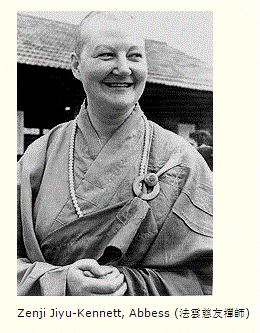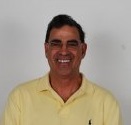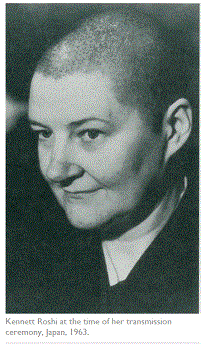Talking with Roshi
Jiyu-Kennett
Morgan Zo Callahan, 1983, Santa Barbara
California

Roshi Jiyu-Kennett, founder of Shasta Abbey, died on
November 6, at the age of seventy-two. In thirty-three years
of teaching, she guided hundreds of students, and her books,
including The Wild, White Goose (1977, 1978) andSelling
Water by the River(1972),* are read widely by Western Zen
practitioners. In her last years of life, however, Kennett
Roshi increasingly isolated herself from other Zen lineages
in the United States and Japan. – Tricycle
Memorial

Morgan Zo Callahan: What is Buddhism for you? What
was its attraction for you, as a young lady in England who
would later go to the Japanese Soto Zen Soji-ji monastery
(’62-’68) to study and practice with your teacher,
Koho Zenji, to whom you offer such admiration and affection;
and then begin Mount Shasta Monastery in ’71 in
Northern California?
How did you come to understand the Buddhist teachings
regarding the cultivation of insight and wisdom, founded in
moral and character development, heart-connected in
compassion? And secondly, you are offering this retreat for
Catholics, and we tend to shy away from Buddhism as
“atheist.” Would you clarify for us
Buddhism’s purpose and heart, which you said in your
talk, is “to find the Eternal,” an aspiration
appreciated by us Catholics who are theists?
Zenji Jiyu-Kennett: Yes, it is the being intimate
with the Eternal that both attracts me and puts my own
practice into perspective, even with the incredibly varying
expressions of what Buddhism is. I acknowledge that some
Buddhists teachers don’t agree with me.
You are a Catholic, yet there are significant places
where we can meet in our two traditions, as well as
acknowledge our theological-philosophical-ritual
differences.
So I will start by quoting an ancient sutta, attributed
to Buddha shortly after his own experiencial finding of the
Eternal: “O monks, there is an Unborn, Undying,
Unchanging, Uncreated. If this were not true, there would
be no point to life and no point to our training.”
This is the nearest Buddhism comes to God; it is the
“apophatic” way of stating that there is
something, as opposed to the “cataphatic” way
which gives specifics of what that Reality is.
Negatively, we say that the great Reality is not
changing, not dying, not being born, not being created; so
we are far form being atheists. Some Buddhists call it
“the deathless.” Zen just refuses to say what it
doesn’t know for sure and encourages people to find out
for themselves rather than rely on doctrine, including
Buddhist doctrine.
Morgan Zo Callahan: Yes, thanks for conveying that
we are in this together, as Buddhists and Catholics; I
appreciate being with you here in Santa Barbara.
I’ve been adjusting my own notion of sin, both
original and personal, from observing the possibility that
we can experience great potential for love in ourselves and
others, by not covering it up so much with all our thinking
and hurtfulness.
I know you speak of moral precepts, which we, Catholics,
also try to embrace as essential to spiritual practice along
with our prayer, worship, meditation, reflection, and
service, with a preference for the poor.
May I review meditatively with you the Five Precepts:
don’t kill; don’t steal; don’t practice
hurtful sexual practices; don’t lie; don’t abuse
intoxicants-expressed positively as, may I practice
compassion, generosity, sexual responsibility, truthfulness
and listening, and mindful consumption?
Zenji Jiyu-Kennett: Yes. There’s a famous
Buddhist scripture which says that the most important human
challenge is to understand birth, life and death completely.
Life and death should not be avoided but embraced, lived,
met completely; being detached does not mean being
disinterested, above it all.
Life and death themselves will be found to be nirvana,
with your sincere involvement.
Practice and taste for yourself. If we find the Eternal
in life and death, then we are no longer so afraid. Even
death is another moment in the Now.
Life becomes a sharing in the Eternal and that’s why
we meditate, to stay in that beautiful, peaceful place with
the Eternal. That’s why we strengthen our ability to
concentrate and to discipline ourselves to be morally
straight. The kingdom of heaven is within each of us.
This teaching can be used by you, as a Catholic, or by
one from any religion or without a religion, because
we’re talking essences of what great religion is,
rather than all the “isms” themselves. Buddhism
does not require any doctrine. Prove it true for your self.
Your questioning of sin is an instructive example. In
Buddhism we say, “Refrain from,” not “ You
shall not.” Your unskillful intentions, speech, and
actions are covering up the original goodness to be
discovered. You do not, in our view, have some outside God
giving you a commandment, but you find out that if you do
good, refrain form being hurtful, greedy, jealous, and mean,
you will then know a peace and happiness.
You only let yourself and others down if you break a
precept; but you don’t feel shame and guilt before a
God. You just dust yourself off and start to practice again;
you don’t feel a fear of a supreme being who will
condemn and punish and judge you. You yourself carry the
consequences.
See Tricycle memorial on Zenji
Jiyu-Kennett

